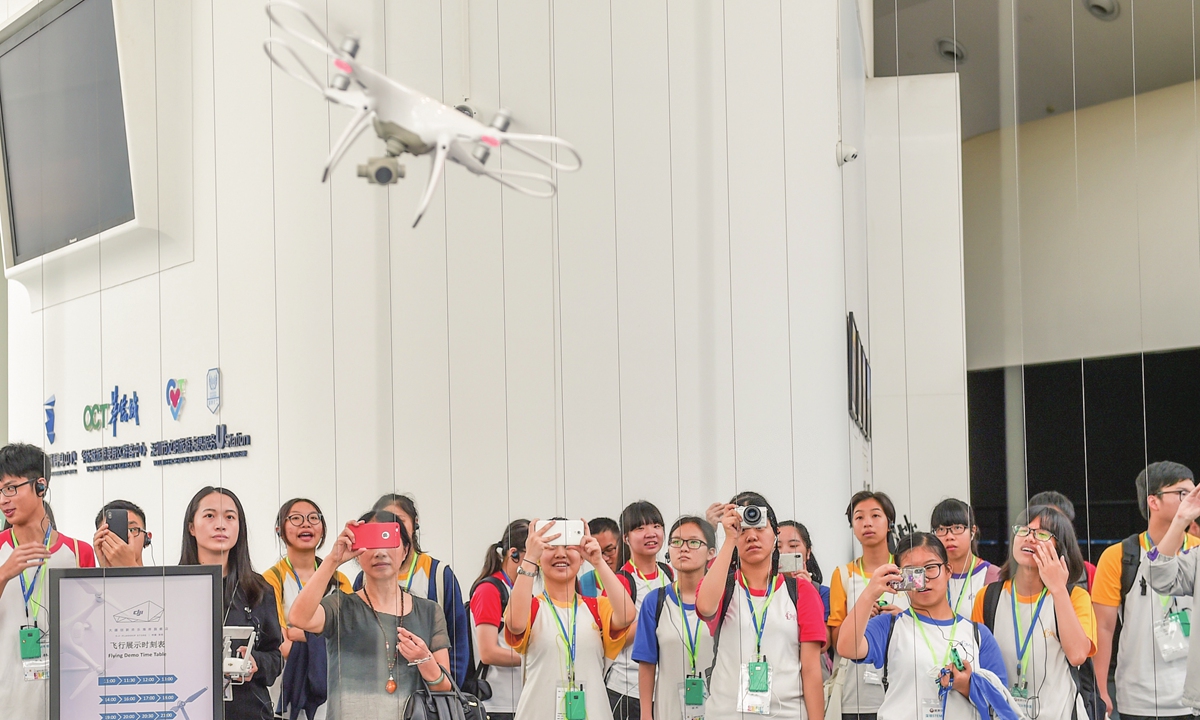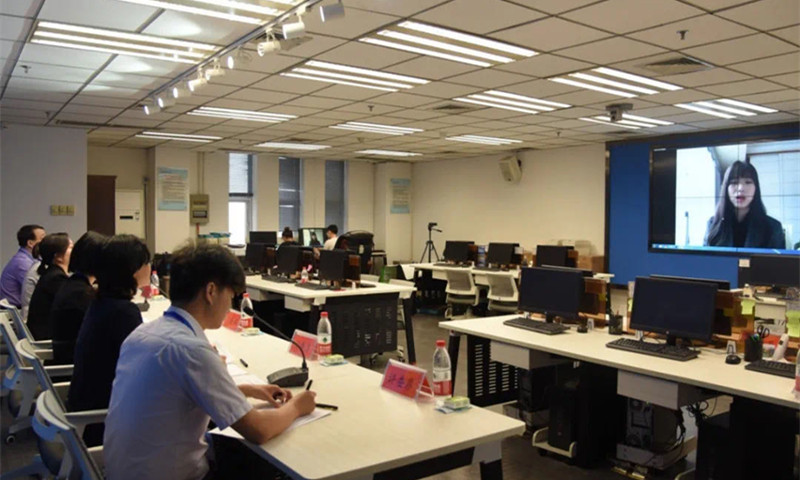More Hong Kong, Taiwan students attracted by mainland universities
By Huang Lanlan Source:Global Times Published: 2020/7/4 10:28:40

Students and teachers from Hong Kong visit a DJI flagship shop in Shenzhen, South China's Guangdong Province during a tour to witness the achievements of China's reform and opening-up in June 2018. Photo: Xinhua
This year, universities in the Chinese mainland have become more attractive for students from the Hong Kong Special Administrative Region, partly because of the months-long turmoil grappling Hong Kong in 2019. Students from the island of Taiwan have also been "competing" for enrollment in the mainland regardless of the impact of the COVID-19 pandemic.
More Hong Kong students are choosing to study in the mainland after problems in their local education system, such as incitement of violence and anti-government sentiment, have been exposed in recent years, some of the students reached by the Global Times said.
In Hong Kong, 7.58 percent of high school graduates who will take the Hong Kong Diploma of Secondary Education Examination (HKDSE) have applied for undergraduate programs at mainland universities this year, reaching a nine-year high, according to statistics released by China Education Exchange (Hong Kong) Centre, 21st Century Business Herald reported in June.
A Hong Kong native surnamed Lau, 25, applied for a postgraduate program in history at Beijing-based Peking University in December 2019, and got an offer at the end of May after passing an online interview.
Graduating from the Chinese University of Hong Kong (CUHK) two years ago, Lau would have planned to apply for postgraduate courses in Hong Kong if there were no riots last year, he said.
"I felt that Hong Kong wouldn't get better at that time," Lau said, recalling having to stay at home in November, when rioters besieged several local universities including CUHK, damaging property and blocking roads that lead to the universities.
"After that, I decided to leave Hong Kong to study in the mainland," Lau told the Global Times.
A total of 3,993 HKDSE candidates have applied to study in the mainland, a 13.7 percent increase year-on-year, according to statistics. The number, plus those who applied through a joint examination and enrollment system that the Chinese Ministry of Education (MOE) sets for students from Hong Kong, Macao, Taiwan and overseas Chinese-resident areas and countries, together make the number of Hong Kong students applying for mainland university programs more than 10,000 this year.
Students from the island of Taiwan also showed their enthusiasm for the mainland universities amid the pandemic, according to Taiwan media reports.

Zhengzhou University interviews a candidate from Taiwan Province (photo: courtesy of the university)
"Taiwan students are competing with each other [to get an opportunity to study in the mainland]," Taipei-based Want Daily said in a June 23 article.The article mentioned Zhengzhou University (ZZU) in Central China's Henan Province, one of the mainland universities that enrolls a lot of Taiwan students every year, has given offers to 87 Taiwan candidates this year.
The number, although slightly down from last year's 109 offers, remains a good one amid the pandemic, when it takes courage for some students to go to a university away from their hometown, said the director of ZZU's admissions office surnamed Xu.
The mainland's fast development is a key element that attracts Taiwan students, many of whom have established a consensus in recent years the economic situation is getting better in the mainland but getting worse in Taiwan, Xu said.
"A Taiwan parent told me that he believes the world's economic center will shift to the mainland in the near future," Xu told the Global Times.
There are more than 12,000 Taiwan students studying in the mainland, said Wang Zhiwei, deputy director of the Office of Hong Kong, Macao and Taiwan Affairs under the MOE, in December 2019.
The enthusiasm among Taiwan students to apply for mainland universities keeps growing, Wang added.
"With a blind superiority complex wearing off, many Taiwan students and parents are willing to come and see what the fast-developing mainland is exactly like regardless of the slanders of the incumbent separatist Taipei authority," Xu said.
Posted in: SOCIETY,HK/MACAO/TAIWAN